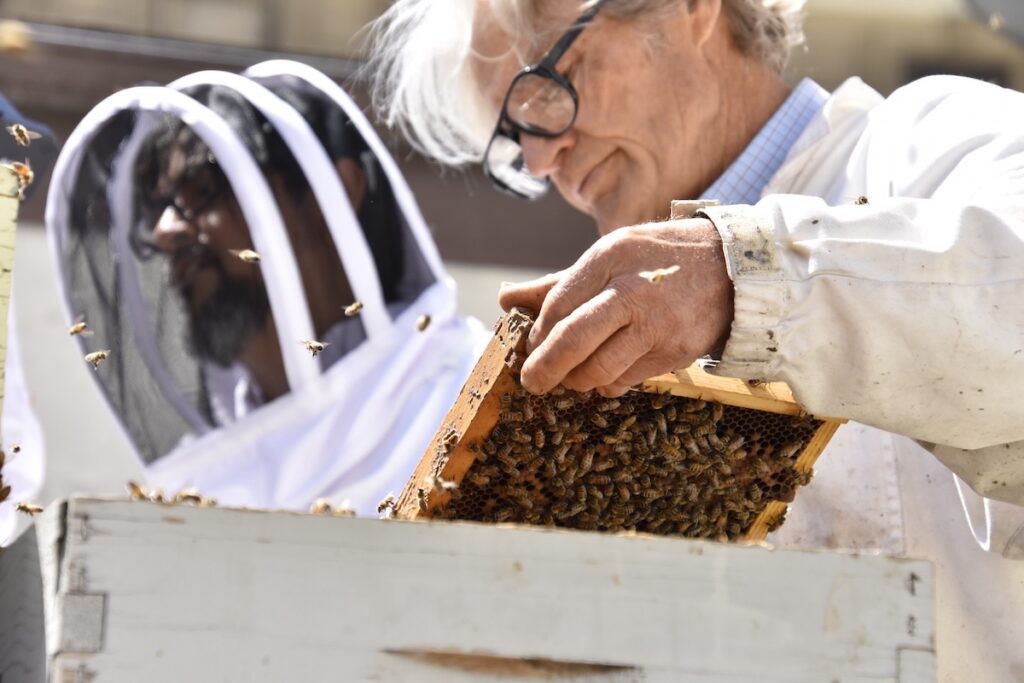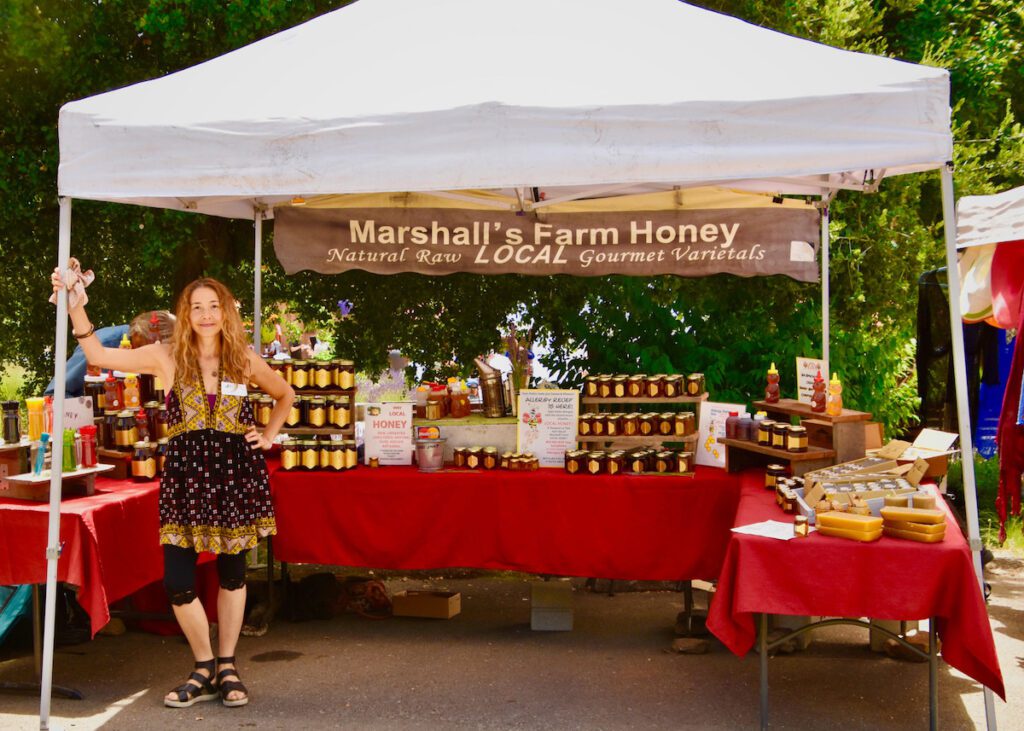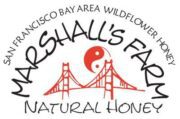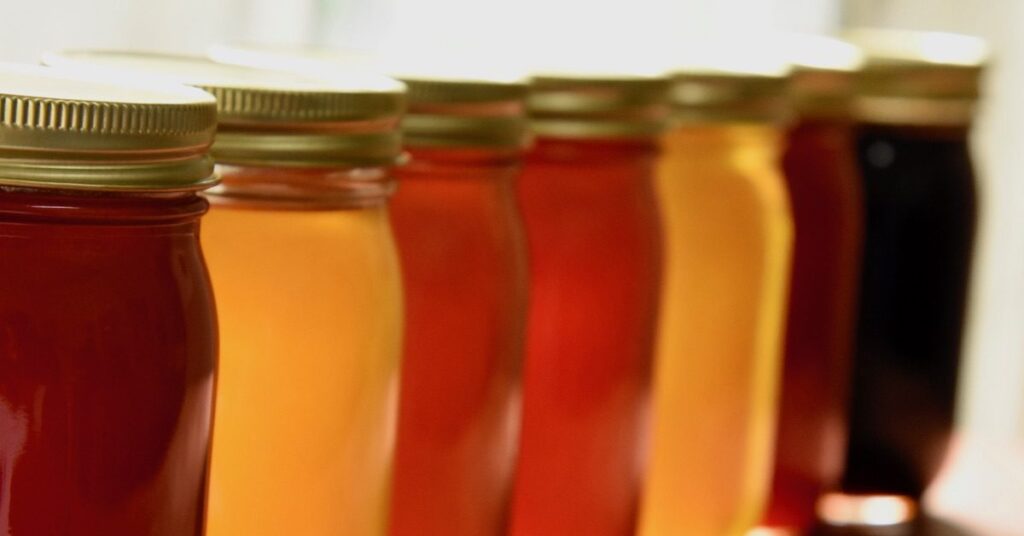It’s preferred by many as a healthier and more natural choice for its powerhouse of nutrients.
Many individuals want to know “what is raw honey” and is it more nutritious than regular honey. With so many different types of honey, it’s important to know the differences. In this article, we’ll break down the specifics along with the common benefits and uses.
What is raw honey?
The term “raw” refers to pure, natural honey that has never been heated (pasteurized) or filtered. This allows the naturally occurring enzymes, vitamins, and minerals to remain intact. It also has no additives, like added sugar, corn syrup, or other sweeteners. So it’s the closest type of honey you can buy straight from the beehive.
Raw honey vs regular honey: what’s the difference?
Regular honey goes through an extensive processing method and pasteurization that can remove natural enzymes, pollen, propolis, and wax. All of which enhances raw honey’s distinct flavor, texture, and color. This is especially true of our honey varietals. Each with its own unique wildflower taste.
Unprocessed honey is preferred by many as a healthier and more natural choice. This is due in part to the wonderful antioxidants, enzymes, pollen, and nutrients that it contains without processing. These natural components make it an excellent choice as a natural sweetener, amongst a variety of other uses.
Other words commonly used to describe honey may include “pure”, “organic”, and “unfiltered”. Don’t be afraid to ask questions so you know exactly how the honey has been processed (if at all) and what the ingredients include. Here is a quick breakdown of the different types:
Raw honey
Harvested directly from the hive with no pasteurization or processing.
Unfiltered honey
Filtering is a process that removes tiny particles, such as bee pollen. So unfiltered is typically considered natural and in its purest form.
Regular honey
Honey that has been pasteurized, filtered, and processed may contain added sugars.
Pure honey
Pure simply means no added ingredients, like corn syrup, or added sugar. Although, some pure honey can also be pasteurized. Be sure to check the labels to ensure that it is still raw.
Wildflower honey
Created from bees eating pollen from a variety of wildflowers in a particular area. This gives it a unique floral taste specific to the wildflowers they feed on, making it a truly rare, specialty honey.
Manuka honey
Made from bees that feed on the manuka bush typically found in New Zealand. It has been said to have additional health benefits.

What are the benefits of raw honey?
Raw is revered by many for its medicinal properties and health benefits. Because it’s harvested and bottled in such a natural way, all of the beneficial nutrients remain for you as the consumer to enjoy.
Natural Sweetener
First and foremost, it’s a natural sweetener known for having a low glycemic index. Meaning it won’t spike your blood sugar levels. This makes it a great choice for individuals with diabetes or other blood sugar disorders. It also contains a variety of beneficial enzymes, amino acids, vitamins, and minerals.
Antioxidants
Unfiltered or un-processed honey contains antioxidants that can help reduce oxidative stress on the body. According to various studies, oxidative stress has been linked to chronic health conditions, such as cancer.
Energy Booster
Many athletes and fitness experts prefer unfiltered as a natural energy source before or after a workout. Honey contains natural sugars which the body easily converts to provide more energy, without the sugar crash.
Medicinal Uses
Because of its powerful anti-inflammatory, anti-bacterial, and anti-fungal properties, raw honey is a preferred medicinal choice of many. Here are some of the common medicinal uses:
- Cough suppressant to support common colds, soar throats, and illnesses.
- Topical wound healing to treat burns, bites, rashes, etc.
- Allergy and asthma support to help acclimate to local pollens. However, those with severe pollen allergies should speak with a doctor or allergist before consuming unfiltered products.
- Immune-boosting phytonutrients to help ward off illness.
- Aids with digestion and overall gut health.
- Possible brain health through the antioxidant and anti-inflammatory properties.
Although unfiltered honey does contain many wonderful nutrients, it can also contain harmful bacteria in its most natural state. We don’t recommend using this as a replacement for serious medical issues or for children younger than 1 year old.
Additionally, if you have an allergy to bees, honey, or bee pollen it may be best to avoid it entirely. Always consult with your doctor if you’d like to consider using unfiltered products to support your overwell well-being.
Natural Moisturizer
Honey can also be found in a variety of skincare and hair care products. Because of its natural antioxidants, it can help fight free radicals on your skin. It also has the ability to draw moisture from the air giving it additional hydration benefits.

Choosing the right kind of honey
When searching for a quality company that provides un-processed varieties, be sure to check the label. You should see a reference or label if it’s “raw” or “unfiltered”. If in doubt, try speaking with a company representative directly or check their website to see if it’s been pasteurized or not.
Where to buy unprocessed honey
Unprocessed products, like ours, can be found at most specialty grocery stores, health food stores, farmers markets, local restaurants, bakeries, wineries, or retailers.
How long does raw honey last
If stored correctly, it shouldn’t ever spoil or expire. In fact, honey has been known to last for thousands of years. Honey can start to lose its flavor and benefits though if left in the cabinet for too long.
How to store it
Honey is best kept at room temperature somewhere between 64 to 75 F. We recommend storing it in a darker area, such as a cabinet or pantry.
How to decrystallize it
Over time unfiltered honey may crystallize and harden. However, it’s still perfectly safe and delicious to eat. Many of our customers prefer crystalized honey to spread on toast or add it to oatmeal, yogurt, coffee, or tea. If you prefer to liquefy and decrystallize your honey, remove the lid and submerge the glass jar in about 2 inches of water making sure to keep the heat very low. Overheating will kill the healthy enzymes, vitamins, and minerals. The honey should be melted within 5 or 10 minutes. Also, do not put it in the microwave because our labels are metallic and they could spark your microwave.
Now that we’ve answered the question “what is raw honey”, our hope is that you’ll want to taste the difference yourself.
Here at Marshall’s Farm, you can choose a variety of honey that best suits your medicinal needs or tastebuds. Our pure, wildflower honey is also a favorite gift idea for birthdays, weddings, holidays, and more. And be sure to keep an eye out for limited other products, like honeycomb, beeswax, bee pollen, and beeswax candles.
DISCLAIMER: THIS WEBSITE DOES NOT PROVIDE MEDICAL ADVICE
The information, including but not limited to, text, graphics, images, and other material contained on this website is for informational purposes only. No material on this site is intended to be a substitute for professional medical advice, diagnosis, or treatment. Always seek the advice of your physician or other qualified health care provider with any questions or concerns you may have regarding a medical condition or treatment and before undertaking a new health care regimen, and never disregard professional medical advice or delay in seeking it because of something you have read on this website.

